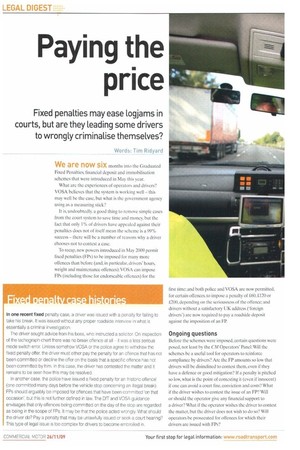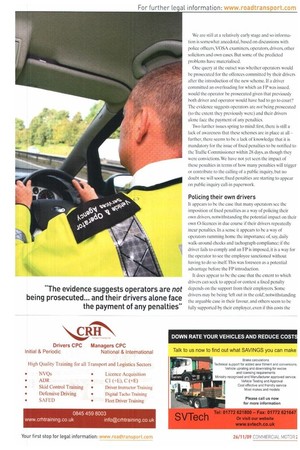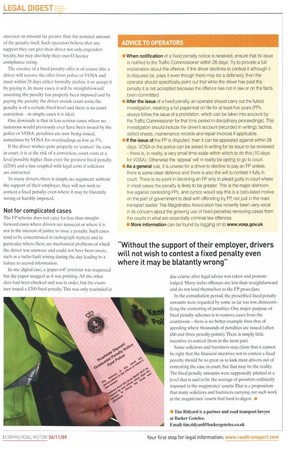Paying the price
Page 28

Page 29

Page 30

If you've noticed an error in this article please click here to report it so we can fix it.
Fixed penalties may ease logjams in courts, but are they leading some drivers to wrongly criminalise themselves?
Words: Tim Ridyard We are six months into the Graduated
Fixed Penalties, financial deposit and immobilisation schemes that were introduced in May this year.
What are the experiences of operators and drivers? VOSA believes that the system is working well — this may well be the case, but what is the government agency using as a measuring stick?
It is, undoubtedly, a good thing to remove simple cases from the court system to save time and money, but the fact that only l % of drivers have appealed against their penalties does not of itself mean the scheme is a 99% success — there will be a number of reasons why a driver chooses not to contest a case.
To recap, new powers introduced in May 2009 permit fixed penalties (FPs) to be imposed for many more offences than before (and, in particular, drivers' hours, weight and maintenance offences): VOSA can impose FPs (including those for endorseable offences) for the
first time and both police and VOSA are now permitted, for certain offences, to impose a penalty of160, £120 or £200, depending on the seriousness of the offence; and drivers without a satisfactory UK address ('foreign drivers') are now required to pay a roadside deposit against the imposition of an FP.
Ongoing questions Before the schemes were imposed, certain questions were posed, not least by the CM Operators' Panel: Will the schemes be a useful tool for operators to reinforce compliance by drivers? Are the FP amounts so low that drivers will be disinclined to contest them, even if they have a defence or good mitigation? If a penalty is pitched so low, what is the point of contesting it (even if innocent) if one can avoid a court fine, conviction and costs? What i.f the driver wishes to contest the issue of an FP? Will or should the operator give any financial support to a driver? What if the operator wishes the driver to contest the matter, but the driver does not wish to do so? Will operators be prosecuted for offences for which their drivers are issued with FPs? We are still at a relatively early stage and so information is somewhat anecdotal, based on discussions with police officers, VOSA examiners, operators, drivers, other solicitors and own cases. But some of the predicted problems have materialised.
One query at the outset was whether operators would be prosecuted for the offences committed by their drivers after the introduction of the new scheme. If a driver committed an overloading for which an FP was issued. would the operator be prosecuted given that previously both driver and operator would have had to go to court? The evidence suggests operators are not being prosecuted (to the extent they previously were) and their drivers alone face the payment of any penalties.
Two further issues spring to mind: first, there is still a lack of awareness that these schemes are in place at all — further, there seems to be a lack of knowledge that it is mandatory for the issue of fixed penalties to be notified to the Traffic Commissioner within 28 days, as though they were convictions. We have not yet seen the impact of these penalties in terms of how many penalties will trigger or contribute to the calling of a public inquiry, but no doubt we will soon; fixed penalties are starting to appear on public inquiry call-in paperwork.
Policing their own drivers
It appears to be the case that many operators see the imposition of fixed penalties as a way of policing their own drivers, notwithstanding the potential impact on their own 0-licences in due course if their drivers repeatedly incur penalties In a sense it appears to be a way of operators ramming home the importance of, say, daily walk-around checks and tachograph compliance: if the driver fails to comply and an FP is imposed, it is a way for the operator to see the employee sanctioned without having to do so itself, This was foreseen as a potential advantage before the FP introduction.
It does appear to be the case that the extent to which drivers can seek to appeal or contest a fixed penalty depends on the support from their employers Some drivers may be being 'left out in the cold', notwithstanding the arguable case in their favour, and others seem to be fully supported by their employer, even if this costs the operator an amount far greater than the nominal amount of the penalty itself Such operators believe that any support they can give their driver not only engenders loyalty, but may also help their own 0-licence compliance rating.
The essence of a fixed penalty offer is of course this: a driver will receive the offer from police or VOSA and must within 28 days either formally decline it or accept it by paying it. In many cases, it will be straightforward: assuming the penalty has properly been imposed and by paying the penalty the driver avoids court costs, the penalty is of a certain, fixed level and there is no court conviction — in simple cases it is ideal.
One downside is that in less serious cases, where no summons would previously ever have been issued by the police or VOSA, penalties are now being issued, sometimes by VOSA for overloadings as low as 5%.
If the driver wishes quite properly to 'contest' the case in court. it is at the risk of a conviction, court costs at a level possibly higher than even the greatest fixed penalty (200) and a fine coupled with legal costs if solicitors are instructed.
To many drivers, there is simply no argument: without the support of their employer, they will not wish to contest a fixed penalty even where it may be blatantly wrong or harshly imposed.
Not for complicated cases
The FP scheme does not cater for less than straightforward cases where drivers are innocent or where it is not in the interest of justice to issue a penalty. Such cases tend to be concentrated in tachograph matters and in particular where there are mechanical problems of which the driver was unaware and could not have been aware, such as a tacho fault arising during the day leading to a failure to record information.
In one digital case, a 'paper-roll' printout was requested but the paper snagged as it was printing. All the other data had been checked and was in order, but the examiner issued a £200 fixed penalty. This was only rescinded in due course after legal advice was taken and protests lodged. Many tacho offences are less than straightforward and do not lend themselves to the FP procedure.
In the consultation period, the prescribed fixed penalty amounts were regarded by some as far too low, disinc.entifying the contesting of penalties. One major purpose of fixed penalty schemes is to remove cases from the courtroom — there is no better example than that of speeding where thousands of penalties are issued (often £60 and three penalty points).There is simply little incentive to contest them in the most part.
Some solicitors and barristers may claim that it cannot be right that the financial incentive not to contest a fixed penalty should be so great as to lock most drivers out of contesting the case in court, but that may be the reality. The fixed penalty amounts were supposedly pitched at a level that is said to be the average of penalties ordinarily imposed in the magistrates' courts. That is a proposition that many solicitors and barristers carrying out such work in the magistrates' courts find hard to digest.








































































































































